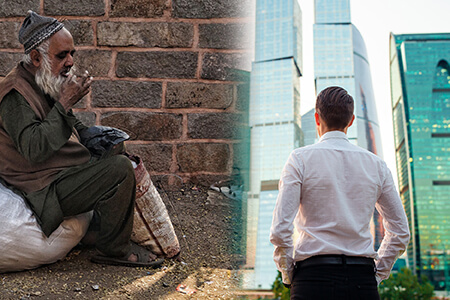 Amos 6:1A, 4-7
Amos 6:1A, 4-7
 1 Timothy 6:11-16
1 Timothy 6:11-16
 Luke 16:19-31
Luke 16:19-31
Our readings for the Sunday are two of the very strong biblical statements regarding justice and responsibility of the rich towards the poor.
The first reading is taken from the remarkable Book of the Prophet Amos, who is a favorite prophet among those who work for justice. He says, "Thus says the Lord God of host: Woe to those who are complacent in Zion... Those who lie on beds of ivory, and lounge upon their couches, while the poor languish" (Amos 6:1-6). What Amos intuits is heart of the Law, the Law of God, from a keen sense of justice to our compassion for any oppressed, marginalized, and poor people of their sufferings.
The overtone of Amos can also be heard clearly in our gospel, the parable of the Dives and Lazarus. “Dives”, a rich man in Latin, is someone who lives in luxury every day. At his gate lied a beggar named Lazarus who is covered with sores and is longing to eat what is fallen off from the rich man's table (Ref Lk 16:19-21). This injustice cries out to heaven for vengeance; then we hear about the rest of the story: "Both men died, Lazarus is taken up to the bosom of Abraham, and Dives is in hell, in torment" (Ref. Lk 16:12-23).
Think of this torment that begins even now. What has been described is the suffering that comes from isolation, for we are meant to be connected to one another precisely through God. When we lock ourselves into the narrow space of our ego, we are in conflict with our own nature, subsequently, we suffer. The rich man is "closed" and "caved in" on himself, and that is the torment on himself, such is the torment holding him captive. The creator God is the Lord of creations, and therefore the owner of all things. Ultimately, nothing belongs to any of us. We do not have control over any of our possessions, instead, God does. We are not masters but only stewards of God’s possessions, and stewardship implies cooperation with God’s intention.
St. Thomas of Aquinas has put it this way. He says, "We have right to ownership the private property, but in regard to the use of our private property, the common good, that means the good of the whole human family, must always be paramount." (Ref. Summa Theologica, I-II, q.66, a.1-2) This is an extraordinary and deeply challenging observation! Therefore, the correct attitude to ask is, “Why is God permitting me to have this wealth?” I can reassure that our whole financial life will take a new turn if we ask that question this way, “What does God want me to do with this money which He allows me to have?”, and “How does my wealth serve God’s will?”
Dear friends, whether we like it or not, the story of Lazarus at the gate reminds us that we are called by God to care for the poor, an image of God Himself.
Acknowledgement
This is an excerpt from Bishop Robert Barron’s homilies, including “Rich man, Poor man”, “Lazarus and the Rich man”, and “Amos's Challenge”. For more information, please visit WordOnFire.org.
